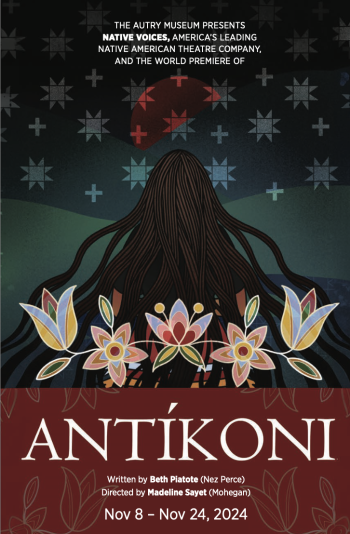ASU English professor directs new Native play 'Antíkoni'

Department of English Clinical Associate Professor Madeline Sayet is directing Antíkoni” — an adaptation of a Greek classic, “Antigone,” centered on the return of Native American ancestors' remains from museums — at the Autry Museum of the American West's Southwest Campus in Los Angeles this month. Photo by Liz Lauren
Over the last three years, Madeline Sayet toured the United States to tell her story in the autobiographical solo-performance play “Where We Belong.” Now, the clinical associate professor in Arizona State University's Department of English is embarking on a new directorial adventure with “Antíkoni,” a Native Voices production.
The play is Beth Piatote’s adaptation of a Greek classic, “Antigone.” It will be performed in the Autry Museum of the American West’s Southwest Campus, the former Southwest Museum of the American Indian, in Los Angeles. The space once housed ancestral remains of Native Americans, the center point of the play.
“They have this story they've been telling for thousands of years about the importance of burying the dead,” Sayet said. “This particular adaptation of 'Antíkoni' really centers on repatriation, on the return of ancestors' remains from museums.”
The original Greek story of Antigone follows her insistence on burying her brother, Polyneices, despite her uncle Creon’s rules and decision. The play acknowledges the human habit of not recognizing one’s own errors until it is too late. In this new play, it is the body of ancestors from long ago that Antíkoni is struggling to have returned home to rest.
“The battle between Antigone and Creon in this version is over working within the system or trying to burn it down, and highlights that the system there in itself is a trap in which neither can win," Sayet said. "It just tears families apart because the terms under which they're trying to figure things out are so difficult.”
Sayet hopes to convey a meaningful story that is able to be understood in a sitting without discarding the traditional layers of the Greek piece. With the framework of a Native play being different in ways ranging from artistic style to philosophical standpoints, Sayet is always interested in seeing how audiences respond to the first time they have the opportunity to watch a Native play.
“That's really a big part of what I care about and what I do. It is important to tell the history and to make sure that people know, but it's also important for people to be able to understand that there are kinds of art they're not even imagining because they haven't been exposed to it,” said Sayet, who is a member of the Arizona Center for Medieval and Renaissance Studies.
Sayet’s work as a playwright and director has been seen across the nation and internationally. She was appointed to serve on the board of trustees for the Institute for American Indian Arts by President Joe Biden and also serves on the board of directors for Red Eagle Soaring: Native Youth Theatre and the Eugene O’Neill Theater Center.
Her autobiographical play, “Where We Belong,” was tied to her Mohegan ancestors’ journeys. In it, Sayet had to navigate stories passed through generations.
“Doing that tour was probably the most difficult thing I ever did because I basically had to go through all of my ancestors having hope, then being betrayed and then me having hope and then being betrayed,” Sayet said.
“It's hard on the brain to actually do the act of having to embody that every day because it means you can't separate it from life,” Sayet said. “There's no moment in the day where you can separate the systems of oppression that have historically enabled these things to happen.”
“Antíkoni” will run Nov. 8–24 at the Autry Museum’s southwest campus. Sayet will also be teaching her Contemporary Native American Drama course this coming spring.
Awards for 'Where We Belong'
Department of English Clinical Associate Professor Madeline Sayet's autobiographical solo-performance play “Where We Belong” toured the U.S. over the past three years, earning accolades:
- Heilman & Haver Award for Best Play of the 2022–2023 Seattle Theatre Season (for the Seattle Rep production of "Where We Belong").
- Nominated for the Jeff Award for Best Solo Performance (for the Chicago production of "Where We Belong" at the Goodman Theatre).
- Nominated for the Audelco Award for Best Solo Performance (for the New York City production of "Where We Belong" at the Public Theater).
More Arts, humanities and education

Local traffic boxes get a colorful makeover
A team of Arizona State University students recently helped transform bland, beige traffic boxes in Chandler into colorful works of public art. “It’s amazing,” said ASU student Sarai…

2 ASU professors, alumnus named 2025 Guggenheim Fellows
Two Arizona State University professors and a university alumnus have been named 2025 Guggenheim Fellows.Regents Professor Sir Jonathan Bate, English Professor of Practice Larissa Fasthorse and…

No argument: ASU-led project improves high school students' writing skills
Students in the freshman English class at Phoenix Trevor G. Browne High School often pop the question to teacher Rocio Rivas.No, not that one.This one:“How is this going to help me?”When Rivas…


